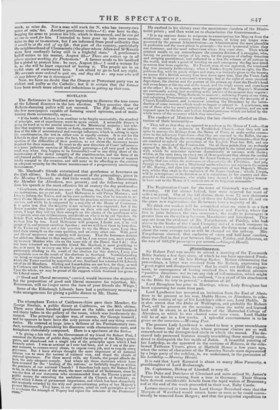The triumphant Tories of Caithness-shire gave their Member, Sir George
Sinclair, a public dinner at Caithness, on the 30th ultimo. There were three hundred gentlemen at the table, and one hundred and thirty ladies in the gallery of the room, which was handsomely decorated. The principal speaker was, of course, Sir George himself; and he appears to have been the only person who said any thing worth notice. He entered at large into a defence of his Parliamentary conduct, occasionally garnishing his discourse with characteristic cant, and metaphors elaborately composed. Here is a specimen of the first
" In giving a fair trial to the Government of my friend Sir Robert Peel, I consulted the dictates of public duty, upheld the integrity of the King's prerogative, and abandoned not a single iota of the principles upon which I had fornierly acted. I was as anxious as I ever had been, and as I am at the present moment, to remove every abuse, to expose every job, and to remedy every grievance. But I have always thought the most important of all national reforms was to stem the torrent of national vice and dispel the clouds of national ignorance. For these moral evils, my friends, the gospel affords the Lest, the only adequate remedy. And where are those doctrines which have been revealed for the ' healing of the nations,' so faithfully taught as within the precincts of our national Church ? I therefore look upon Sir Robert Peel to be, in the best sense of the word, the most radical of all Reformers, since he was the first of our statesmen who recommended from the Throne a grant of Public money for extending the usefulness of the Church of Scotland ; an object which I deem of paramount importance, and which has been shamefully anti wantonly retarded by the wily and procrastinating policy of her Majesty's Present Ministers. They have, in my opinion, acted on such pi inciples as tend to accelerate the triumph of Popery and injure the interests of the Protestant cause." He exulted in his victory over the anonymous slanders of the Ministerial prints ; and then went on to characterize the Government " It is my anxious desire to coiiperate to emancipating her 'Majesty from the misfortune, and our country from the disgrace, of being any longer milegoverned by the present Administration—an Administration the most plausible in profession and the most pliant in principle—the most tyrannical where they can domineer, and the most subservient where they must obey. Their whole conduct recalls to my remembrance the cunning devices of a smuggler, who, having no particular ensign of his own, for the purpose of eluding detection and escaping punishment, had collected in a box the colours of all nations lot the world, and made a point of hoisting on each emergency the flag best fitted to screen him from captivity. If a French man•of-war appeared, the tricolored flag was instantly forthcoming; when a Yankee frigate hove in sight, the Re. publican flag, with its gaudy stripes and stars, was instantly given to the breeze; no sooner did a British seventy-four bear down upon him, than the Union Tack made its appearance at a moment's warning ; but at the sight of some piratical depredator, the abettor and the punier of his crimes, up went the Death's head and cross-bones at the one end of the vessel, and the triple crown and cross keys at the other ! It is, my friends, upon this principle that her Majesty's .Ministere are continually acting, just according as the interest of the moment may require: Conservatives toolay, Whig-Radicals to. morrow ; endowing Popery at one time, and eulogizing Protestantion at another ; maintaining to-day the necessity of a Church Establishment, and to-morrow courting the Dissenters by the introduction of some measure which trolls to impair or subvert it. I, gentlemen, ars one of those who try men's principles by the test of their practice, and am nob imposed upon by the false and hollow-hearted pretences which are belied by the whole tenor of the measures which they introduce."
The conduct of Ministers dull's the late elections afforded an illustration of their insincerity
" They tell us that they are opposed to a reform in the House of Lords—thali they are anxious to maintain an Establidied Church—that they will not
agree to remove the Bishops front the House of Peers, or make undue conces
sions to the refractory Carrelians—that they are opposed to the Ballot, the extension of the Suffrage, the shortening of the duration of Parliaments—that they are resolved to uphold the provisions of the English Poor-law Bill, and are averse to a revision of the Pension-list. On all these points they are zealously opposed by Mr. D. W. Harvey, who is distinguished by the talent and eloquence
with which he maintains opinions diametrically at variance with thrice;
whilst, at the same time, on every one of these questions they obtain the cordial support of my distinguished friend Sir James Graham, so preeminent in every quality that can adorn the statesman or charactcrizc the Christian. And yet,
strange to say, there is not a Ministerial scribe who does not rejoice in the return of Mr. Harvey, and class him amongst the supparters of her Majesty's Minis.
tcrs, whilst they exult in the exclusion of Si, James Grahtna ; which, I trust, will be as temporal y in its duration as it is calamitous to his country and illsgraceful to the constituency, oho might have deemed it their highest honour to have sent to the House of Cmunons one of its brightest ornaments."


























 Previous page
Previous page